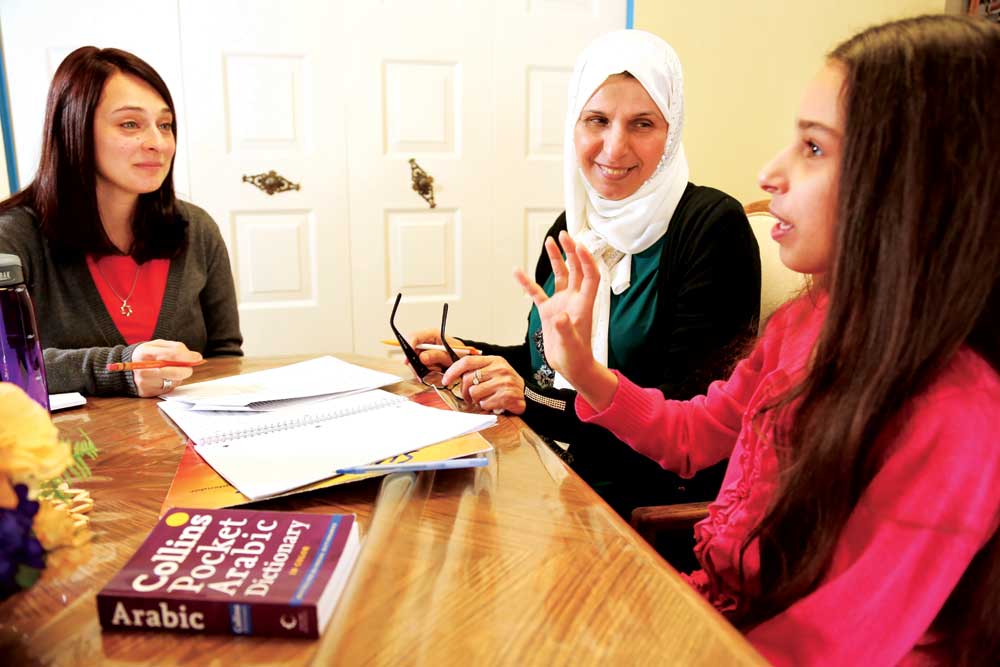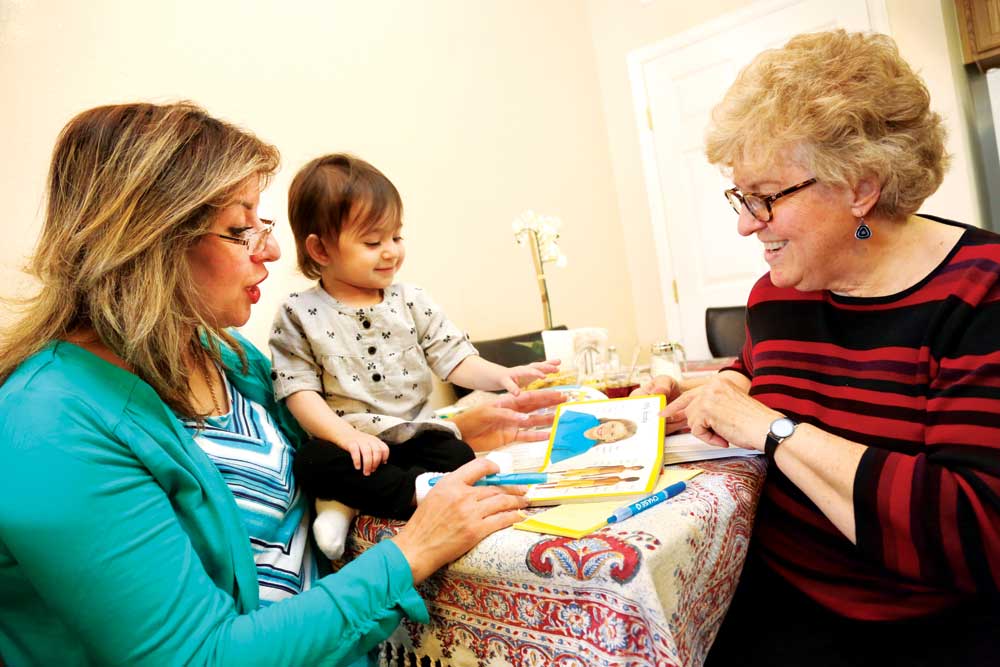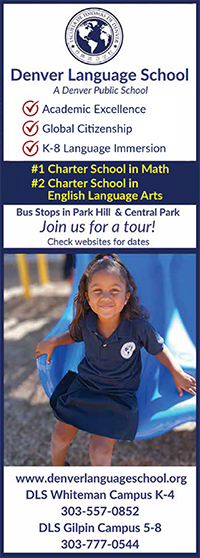
Left, Chanelle Redmon, a volunteer with the Colorado Refugee ESL program, sits with Eman Ali and her daughter, Al’Zahra, sixth grade.
What would you do if you were forced to leave your country, your home and all your possessions behind, and start over in a place with a completely unfamiliar language and culture?
“You don’t know what you’d do until you’re in that situation,” said Sharon McCreary, volunteer coordinator for the Colorado Refugee ESL [English as a second language] Program. “Our students are regular people in unfortunate circumstances. Many say, ‘I had a normal life; I didn’t think trouble would come to my town.’ But they find themselves in a long and grueling process of starting over.”
“Learning the language is the first step in becoming part of the fabric of our community,” McCreary said. “Our volunteer is often the first friendly smiling American they meet, who is not paid to be there.”
Chanelle Redmon of Stapleton, 27, began volunteering as an in-home tutor last fall and works with Eman Ali, a mother of four from Iraq. “This work enlightens me,” she said. “Eman is so grateful, it makes me grateful to give my time. Every lesson with her is an adventure and I enjoy getting to know more about them and their culture.”
By the time they reach Denver, refugees have gone through a myriad of harrowing experiences.

ESL tutor Ann Lockhart (right) helps Shabnam Asgari, an Iranian immigrant, and her 16-month-old daughter, Ariana, read a picture book in English. Lockhart feels that picture books speed up the process of learning a new language.
“Eman Ali and her family fled Saddam Hussein’s regime in Iraq in 1999, after her brother was killed by Hussein’s people,” said Redmon. “Hussein’s people started to follow her family and they felt their lives were threatened. Eman’s family were Shia Muslims and Hussein was killing people who weren’t Sunni Muslims. Eman, her husband Bassam, and their four daughters went to Libya until 2011 and then on to Tunisia. They had to sell everything to survive.”
Park Hill resident Ann Lockhart tutors Shabnam, who fled Iran with her husband. “Shabnam was imprisoned and tortured as a political prisoner in Iran,” Lockhart said. “She protested the government there and was put in jail and beaten for two weeks, then strangled, taken outside of town and left for dead. They have a baby now, and she has a bad back so she doesn’t get out much. Her husband works two jobs, seven days a week.”
Lockhart has volunteered with CRESL since 2000, tutoring people from Sudan, Iraq, Somalia, Burundi, Bhutan and Iran. “I feel for the people who come here under traumatic circumstances with no money,” said Lockhart, a retired journalist. “They start over in a new country with a new language. It takes a while for them to find new friends, jobs and schools. They really need and want our help. It’s personally rewarding to form lasting relationships with them.”
Refugees who land in Denver find help and a friend in Colorado Refugee ESL (CRESL), whose staff and volunteers provide English instruction, as well as acculturation lessons. Newly arrived refugees attend classes at Emily Griffith Technical College in downtown Denver. Volunteer in-home tutors go to the homes of those who cannot attend classes because they lack childcare or have a physical disability.
CRESL serves refugees from all over the world. “Currently, refugees coming into the U.S. are mostly from Burma, Bhutan, Somalia, Eritrea, Iraq, Afghanistan, and Democratic Republic of the Congo,” McCreary said. “They come here through a joint effort of the U.S. State Department and the United Nations. The overwhelming majority of refugees in our area live close to Stapleton, with the largest concentrations near 13th Ave. and Yosemite Street.”
 McCreary said most people don’t realize the difference between refugees and immigrants. Refugees have been forced to flee their homeland, and are unable to return, because of persecution on account of race, religion, nationality or political opinion. They find refuge in our country through the United States refugee resettlement program.
McCreary said most people don’t realize the difference between refugees and immigrants. Refugees have been forced to flee their homeland, and are unable to return, because of persecution on account of race, religion, nationality or political opinion. They find refuge in our country through the United States refugee resettlement program.
Resettlement is a difficult process, McCreary said. “The refugees receive some help, but they are expected to be employed within six months. They have been heavily traumatized and often PTSD comes up later. Often they have medical issues, and they struggle to feed their kids. All this can slow their learning the language.”
She said certain circumstances may help or hinder the resettlement process:
“Those who came from a middle-class life know how to live in a modern building, how to shop and use transportation, and have a mainstream job. On the other end, the Somali Bantu, who were farmers, find themselves plunked down at 13th and Yosemite and say, ‘What the heck?’ They have no experience with electricity or plumbing, or sending their kids to school.”
Educated people settle in more easily, as do children. “Eman and Bassam Ali were teachers in Baghdad,” said Redmon. “The whole family is well-educated. Eman makes good progress with learning English because she puts it in context; she thinks of new ways to understand.”
“Kids are more adaptable and they learn languages faster than adults,” said McCreary. “Plus they are in school so they get more exposure to English. They often get called on to be translators for their parents.”
McCreary is looking for more volunteer in-home tutors from the Stapleton and Lowry neighborhoods. “Volunteers experience that people are so much more alike than different across cultures, and that people do want each other to succeed.”
For more information, go to www.refugee-esl.org or call 720.423.4843.
Volunteer Training for Colorado Refugee ESL Program
March 7 or Saturday, April 25,
8am to 4pm
Emily Griffith Technical College,
1860 Lincoln
Preregistration is required
Call Sharon McCreary 720-423-4843




Hello – I am very interested in learning how to be a volunteer teaching immigrants and/or refugees English! I would be interested in joining the March training. Please let me know what I need to do to get involved.
Thanks so much,
Carmen Carl
Please call the contact number listed in the article.